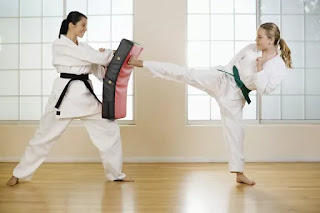The Risks and Benefits of Martial Arts Classes for Teens
How Martial Arts Benefits Teens
Whether you want your teen to gain some basic self-defense skills, or you’re hoping she’ll learn self-discipline by repeating the same moves over and over again, martial arts can be a great teaching tool.
Here are a few of the physical and mental health benefits:
Whether you want your teen to gain some basic self-defense skills, or you’re hoping she’ll learn self-discipline by repeating the same moves over and over again, martial arts can be a great teaching tool.
Here are a few of the physical and mental health benefits:
- Improved muscle strength
- Better balance
- Enhanced flexibility
- Improved cognitive function
- Higher self-esteem
- More self-respect
- Better self-awareness
The Most Common Injuries From Martial Arts
Like any other physical activity, martial arts pose some risk of injury. Here are some of the most common injuries your teen may experience while participating in martial arts:
- Sprains
- Strains
- Contusions
- Fractures (from falling)
- Hyperextension of the joints
- Nosebleeds
- Although less common, there are risks of more serious injuries, such as head or neck injuries. But many of those can be prevented with appropriate precautions.
How to Reduce the Risk of Injury
Before enrolling your teen in martial arts, talk to the pediatrician. Discuss which specific form of martial arts you are considering and ask the doctor if your teen is healthy enough to participate.
Here are some other things you can do to reduce the risk of injury:
Talk to the instructor first. Call the instructor and ask questions about training, experience, and philosophy before signing your teen up for classes. Look for an instructor who only encourages competition once students display adequate emotional and physical maturity, as well as adequate skills.
Start with lower contact forms of martial arts. Look for a martial arts class that doesn't involve a lot of contact. Then, if your teen shows self-discipline and maturity, consider moving into a more competitive environment, if she is interested.
Only allow your teen to compete in a safe environment. Competitions should discourage blows to the head and should deduct points for illegal and dangerous moves. Make sure your teen is being taught proper defensive blocking moves before allowing him to enter a competition.
Talk to the instructor and your doctor about safety equipment. A mouthguard, for example, may reduce oral injuries. Talk about soft headgear as well. While some studies show headgear may reduce the risk of concussions, other research is inconclusive.



Comments
Post a Comment